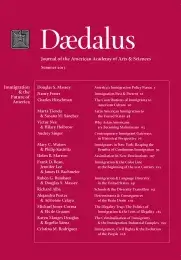The Illegality Trap: The Politics of Immigration & the Lens of Illegality
The focus on undocumented immigrants in contemporary U.S. immigration debates, often at the expense of other immigration issues, has led to an illegality trap. This situation has serious negative consequences for both U.S. immigration policy and immigrants, including an overwhelming emphasis on enforcement; legislative gridlock and the failure of comprehensive immigration reform; constitutional conflict resulting from tensions between national, state, and local approaches to dealing with undocumented immigration; and the puzzling absence of federal policies addressing immigrant integration. This essay argues for a reframing of “illegality” as a contingent rather than categorical status, building on the insights of Plyler v. Doe and notions of implied contract and attachment to U.S. society. Doing so, we contend, will shift the terms of the immigration debate, enabling more fruitful policy discussions about both immigration and immigrant integration.
Americans have disagreed about immigration since the founding of the republic. What is curious about the contemporary immigration debate, however, is the degree to which it is focused on “illegal” immigrants. The heated rhetoric and deep partisan divisions over undocumented immigration disguise the fact that there is a durable and broadbased consensus about legal migration to the United States, dating back to the 1965 Immigration and Nationality Act. The key provisions of the 1965 act– equal quotas by country and region and a commitment to family reunification–still guide the federal government’s decisions about whom to admit to the country as legal migrants. However, the current debate obscures this underlying consensus and instead focuses on the conundrum of undocumented migrants currently living in the United States. This emphasis is ultimately dysfunctional for immigration policy and detrimental to the incorporation of . . .
